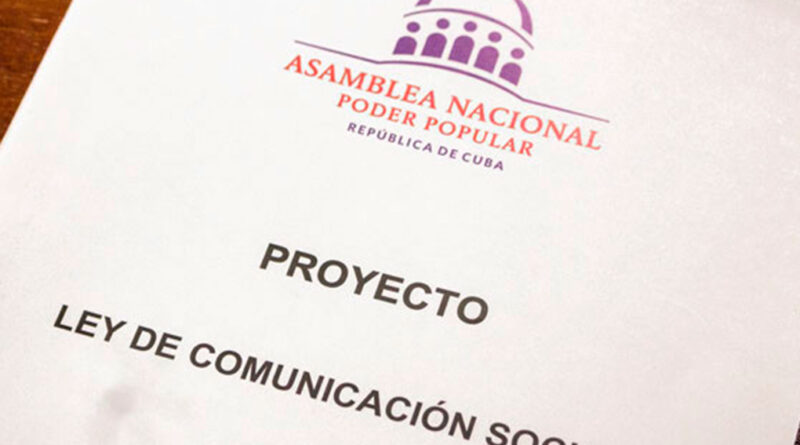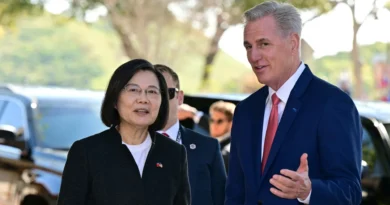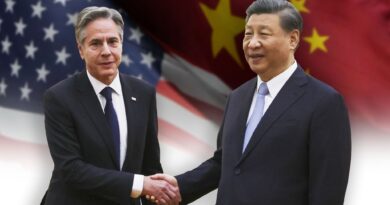The Cuban Communication Law shows us how journalism could be under socialism
PASCUAL SERRANO
The National Assembly of Popular Power of Cuba approved on May 25 the Social Communication Law. Among other purposes, as stated in the document, the normative text "seeks to regulate the Social Communication System in the organizational, media and community spheres, for political, public good, organizational and commercial purposes, both in public-physical spaces and in the digital ones.
This law is intended to establish the principles of organization and operation for all social communication media in the country.
For Cuba, its drafting was an important challenge because it is the first legislative project on this matter that is promoted in the country, and it had to address many complexities due to the socialist nature of its political system and media and ideological harassment (as well as economic). that suffers.
It had to combine sufficient democratization and participation of professionals and citizens, with shielding from external interference aimed at combating its model. In addition, the viability of the state media must be guaranteed, today underfinanced, technologically backward and at a disadvantage compared to the media, financed from abroad, that try to impose their agenda and directly overthrow the Cuban government.
The first phase of preparation was to consult the entire doctrinal corpus that had been developed in the country outside the legislative framework. In the very introduction of the law, it is recalled that "the fundamental agreements and approaches of congresses and other forums of the Union of Cuban Journalists (UPEC), the Cuban Association of Social Communicators (ACCS), the Union of Writers and Artists of Cuba (UNEAC) and the Hermanos Saíz Association", which have consulted "312 legal, ethical and political documents on communication practice in Cuba since the colonial period", as well as the contributions of "more than 90 theses of undergraduate and graduate from different universities in the country and other research on the subject.
Production process
It is very important to observe the process of drafting this law, based on debate and popular consultation, as already happened with the constitutional reform in 2018 or the Family Code in the past year, which was even ratified in a referendum.
There was a long process of collective discussion of several months in which specialized consultations were carried out with the participation of university students and professors, journalists, artists, social communicators and other professionals, delegates to the Municipal Assemblies of Popular Power and deputies, political and government leaders, entrepreneurs and new economic actors. 7.496 people from various sectors, professions and organizations who exchanged in person with the drafting team.
In addition, 1.426 opinions and considerations were also received through email and other digital channels, which generated the transformation of 79.71% of the original articles.
Subsequently, there was a new revision with another 69 changes in content and form, which represented a 59.48% difference with respect to the original text.
The State informing the people
One of the characteristics of socialist governments has been the obscurantism of information. While Western countries made progress in the transparency of administrative decisions (budgets, debates, laws...), the control of information was a constant in the communism of the former Eastern bloc and also in the countries of its ideological trail.
For this reason, one of the challenges that Cuban legislators faced was to break that tradition, that way of operating. The law had to make it clear that citizens had the right to information, and that journalists should not find obstacles in the institutions to access it.
The law begins by recalling that, according to the Cuban Constitution, "State bodies, their managers, officials and employees have the obligation to attend to, respect and respond to the people, maintain close ties with them and submit to their control."
For this reason, invoking this principle, this law guarantees that Cubans can "request and receive truthful, objective and timely information from the State, and have access to what is generated."nere in the organs of the State and entities”.
It is also added (article 12) that the information requested from the required officials or departments can be legally claimed. The latter is important, because everyone in Cuba knows that it is one thing to reflect it in the laws and quite another, to get officials and bureaucrats to abide by them.
essential purposes
Unlike capitalist systems, socialism is based on ideological principles and values. Not only the speeches of the rulers, but also the laws have the rhetoric of those who make clear objectives that are considered ethical and inalienable. In the Social Communication System, according to the law, among those “essential purposes” (Article 7), the following stand out:
- “Defend the independence, integrity and sovereignty of the homeland, and preserve national security;
- contribute to achieving a more democratic society, with higher levels of social justice, more inclusive, equitable, participatory, supportive and in harmony with the environment;
- contribute to the political, economic, social, educational, scientific, technological and cultural development of the country, which ensures individual and collective prosperity in a sustainable manner; exalt the identity, culture, values, symbols, history and humanist ethics of the nation;
- respect cultural diversity, without discrimination based on sex, gender, sexual orientation, gender identity, age, ethnic origin, skin color, religious belief, disability, national or territorial origin, or any other condition or personal circumstance that implies distinction harmful to human dignity;
- facilitate the right to information, communication and knowledge;
- guarantee the public character of the fundamental means of social communication”.
About the contents
In these times of fake news and post-truths, facing this problem through the law is the way to get informed and trained citizens. A misunderstanding of freedom of expression in our countries, together with the development of new technologies and social networks, is allowing hoaxes and false news to deteriorate our democracies by creating deceived and deceived citizens.
Cuba must also face the problem of information quality. For this reason, it is established that (article 8) "the information that is exchanged in the processes of social communication must be truthful, objective, timely, updated, verifiable and understandable".
This above usually also appears in all laws, in the Spanish case in the Constitution itself the "right to truthful information" is cited. The problem is that, if it is not developed, it becomes another right that is not guaranteed.
That is why Cuban law has established that news content must meet these requirements:
- “they have to be verified, contextualized and contrasted as a guarantee of veracity;
- they constitute an expression of adherence to ethics and responsibility;
- they promote peace, inclusion, decency and social coexistence;
- they protect honor, identity and individual and family privacy, as well as image, voice and other personal data”.
As in any other country, the laws establish mechanisms to guarantee institutionality and stability. In the case of Cuba, where harassment and aggression is a constant in its history, the legislators have reflected these mechanisms, making it clear that the news content can in no case:
- “To be used with the objective of subverting the constitutional order and destabilizing the socialist State of law and social justice;
- support the communicational aggression that is taking place against the country;
- instigating terrorism and war in any of its forms and manifestations, including cyberwar;
- encourage violence and hatred between people.”
Added to this are other contents of individual respect and journalistic ethics that are not always guaranteed in the world's communication systems. Hence, it is also prohibited:
- “harass, coerce, humiliate or discriminate against a person or groups, based on sex, gender, sexual orientation, gender identity, age, ethnic origin, skin color, religious belief, disability, national or territorial origin, or any another personal condition or circumstance that implies a distinction that is detrimental to human dignity;
- be used to give morbid treatment to accidents, criminal acts, disasters or other similar events;
- reflect or encourage pornography, prostitution, gambling or topics that encourage the use of drugs or other illegal substances;
- defame, slander or insult the people, organs, agencies and entities of the State, political, mass and social organizations of the country”.
Audience Rights
Like the lack of transparency, individual rights against the state apparatus have not been very developed in socialist systems either. Cuban law has wanted to break that tradition and establishes the right to rectification or statement of fact (article 18.1) when a natural or legal person is considered unjustly affected by content disclosed through the media of social communication.
The calls for participation and collective interests are constant in socialism and could not be forgotten in the Cuban Communication Law. In it, it also establishes that "the fundamental means of social communication stimulate popular participation in the economic, social and cultural development of the country, make state management and the exercise of socialist democracy visible with transparency, strengthen the values and identity of the nation and mobilize social action to defend the interests of the people”.
The challenge now will be to make it effective so that it does not remain mere legislative rhetoric, as common in capitalism as in socialism.
media responsibilities
The guarantees on the quality of the contents will not be effective if, in addition to appealing to those contents, the media and their managers are not pointed out as responsible for compliance. In our countries, there are few legal requirements for the responsibility of the media. Thanks to the mere appeal to their deontology or to the scarecrow of state interventionism, the impunity of the Western media with the alibi of press freedom is absolute to avoid any social responsibility or ethical obligation.
Cuban law does not renounce interventionism that requires fundamental responsibilities of social communication from the media (article 33), another interesting novelty. These are some:
- “Privilege in their agendas (…) the contents that respond to the interests and priorities of the nation and the communication needs of the audiences;
- guarantee in its management the critical reflection of reality and the exercise of opinion on the basis of research and responsible analysis;
- ensure citizen participation in content management, which includes debate on matters of interest to society and communication actions as a way to exercise popular control;
- prioritize in its content management those that contribute to the education of audiences and the promotion in them of critical thinking, social equality, anti-racism and decolonization;
- prioritize the production of communicative proposals aimed at entertainment, which ethically and responsibly promote personal and collective well-being;
- promote people's participation in the development, implementation, and evaluation of public policies, as part of popular control processes;
- ponder the generation of content aimed at girls, boys, adolescents, young people and older adults”.
Rights and obligations of journalists
It is not possible to legislate on communication if the rights and obligations of journalists are not raised. In our countries, these rights are barely included in the laws. In the Spanish case, attempts were made more than a decade ago to approve a Statute for Journalists, but it was never done. At present, the closest thing is the Press and Printing Law and in the revised text of the Statute of the Journalistic Profession, approved during the Franco dictatorship in the 60s. Meanwhile, the only rights of journalists are to "refuse to to participate in the preparation of information contrary to the ethical principles of communication” and leave the company if the editorial line changes. Hence, the right to "participate in the editorial management of their medium" stands out in the Cuban Communication Law. In addition to this, it is also contemplated, among others (article 35):
- “Carry out, within the framework of legality, the professional actions necessary to obtain the truthful, objective and timely information that the fulfillment of their functions demands;
- denounce those acts of people or organizations that offer erroneous content, hinder access to information or limit the fulfillment of their functions;
- publicly protect the identity of the source that has requested to remain anonymous, in compliance with the ethical precepts of the profession”.
Regarding the obligations, the majority are with the objective of guaranteeing good information and preventing bribery (article 36):
- “Inform with immediacy, coherence, precision and adherence to the truth;
- observe the rules of verification, contextualization and contrasting of the information to be used;
- refrain from accepting economic contributions or any personal benefit that compromise their ethics and the prestige of the media they represent”.
advertising arrives
One of the novelties of the law is that the so-called "fundamental means of social communication", in addition to being financed by the State budget, can supplement their income with "the commercialization inside and outside the country of their productions and services, the sale of advertising spaces, sponsorship, national and international cooperation projects and other means, all legally recognized, provided that the fulfillment of its public function is not compromised.
This was a demand from Cuban journalists, who suffered from the precarious budget of public media. At the same time, it was also the subject of concern about the influence that these new funders could have on the content.
Cuba has verified the phenomenon of the proliferation of private or foreign media, some as mere web pages or blogs of "independent" journalists, who obtained foreign income greater than any state media, and whose journalists ended up being better paid than public journalists. It was perhaps the only country in the world where being an opposition journalist to the government was more lucrative than being a director of a public media outlet or being a minister.
That is why the "approval of the Central State Administration agencies" is now required to receive advertising revenue.
In any case, for the rest of the media, the law specifies that "they maintain their communicative production on lawful and transparent sources of financing, whose origin does not have the objective of subverting the constitutional order established in the country."
This aspect is emphasized, making it clear that "the development of advertising and sponsorship takes place from lawful and transparent sources of financing that can be audited, and whose origin does not have the objective of subverting the constitutional order established in the country" .
The incorporation of advertising has required a whole section in the law. The socialist countries, since the market is not so developed, have not proposed control and regulation mechanisms for advertising. Hence, it is in this law where some elements have been included to avoid the objectification of women or misleading advertising:
- “prohibit the presentation of women in a degrading or vexatious manner, associated with stereotyped sociocultural patterns that violate their rights;
- guarantee the veracity and correspondence of the advertising message with the qualities of the brands, products and services that are promoted”.
In the specific case of radio and television, it is specified that “advertising is only placed in blocks between programs on television channels, and between programs and program segments on radio stations; in both media it corresponds to what is approved in the programming schedule”.
In addition, it will be prohibited “the interruption of the programs and the transmission or retransmission of cultural shows and sports activities; their inclusion in programming aimed at children and adolescents and in the news and other informative spaces”.
Precisely these advertising limitation measures have been losing prominence in the different European directives, in such a way that today a higher percentage of advertising and more interruptions are allowed than twenty years ago.
It is worth noting the decision of the Spanish public radio and television (RTVE) to eliminate advertising on its different channels. Something that was approved during the government of Rodríguez Zapatero, not without controversy due to the decrease in budget income that it could mean for public television.
foreign press
There is also a section for those who usually accuse the Cuban government of impeding the work of foreign correspondents. It is important to note that the new law establishes that "the Cuban State favors the presence in the country of foreign press media and their correspondents , and propitiates the conditions for their work”.
community media
Another object of regulation is the community media, one of the battles of citizen mobilization in capitalist countries. Although they have made progress under progressive governments in Latin America, Europe, and especially in Spain, their implementation is minimal and precarious. This has been taken care of, not only by the harsh market conditions that impede its viability, but also by the regional governments that have not issued licenses or even legislation that prohibits community radio and television stations from not exceeding a certain turnover to ensure that they can never compete with the commercial ones
Cuban law is in its favor, pointing out that its existence "is based on popular participation and multiple actors in the materialization of the aspirations of the community, as well as in the identification and implementation of alternative solutions to their demands and problems."
Among its characteristics, establishing "links aimed at strengthening their own capacities and encouraging the initiative and broad participation of the population in the integral development of the cities, towns, neighborhoods, towns and rural areas that make up the municipality."
Logically it will be necessary to develop norms and economic resources to ensure its good and democratic functioning.
Internet
In the internet section, the law shows its concern about the possibilities of manipulation that have opened up with new technologies, and even more so now with artificial intelligence. That is why it is established "not to allow the use of content made from already existing images, texts, audios and videos, to create distorted realities for any purpose or purpose".
communication in socialism
In conclusion, we are facing an unprecedented law for Cuba, but also for the world. A law that presents us with how communication, journalism and the media could be in a non-capitalist society.
A norm that addresses the veracity and quality of information, citizen participation, the social principles of journalism, the recognition of journalists with their rights and obligations, respect for diversity, the right of citizens to information transparency of its institutions and the rectification in the media, the financial and ethical control of advertising.
Precisely many of the things that we miss in the media of capitalist societies and that, in some cases, are even incompatible with capitalism.
Observing how it develops and how it is fulfilled will be fundamental so that governments and citizens who today know that the market is not paying attention to true freedom of expression and information can envision alternatives.
Pascual Serrano He is a journalist and writer. His last book is "Forbidden to doubt. The ten weeks in which Ukraine changed the world”













